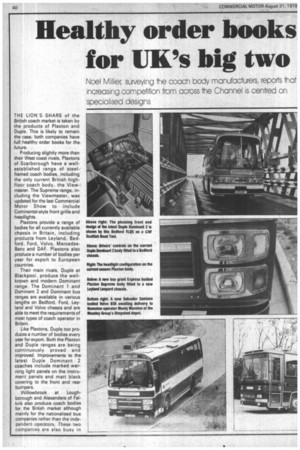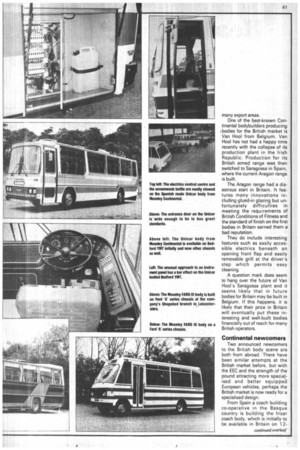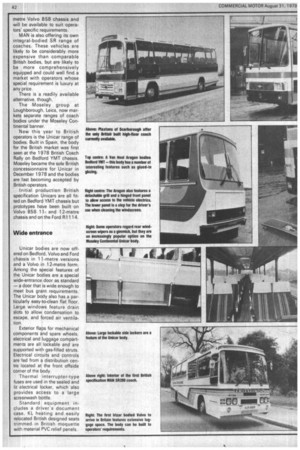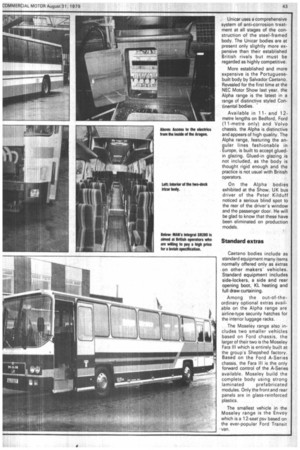Healthy order books
Page 42

Page 43

Page 44

Page 45

If you've noticed an error in this article please click here to report it so we can fix it.
for UK's big two
Noel Millier, surveying the coach body manufacturers, reports nat increasing competition from across the Channel is centred on specialised designs
THE LION'S SHARE of the British coach market is taken by the products of Plaxton and Duple. This is likely to remain the case: both companies have full healthy order books for the future.
Producing slightly more than their West coast rivals, Plaxtons of Scarborough have a wellestablished range of steelframed coach bodies, including the only current British highfloor coach body, the View-: master. The Supreme range, including the Viewmaster, was updated for the last Commercial Motor Show to include Continental-style front grille and headlights.
Plaxtons provide a range of bodies for all currently available chassis in Britain, including products from Leyland, Bedford, Ford, Volvo, MercedesBenz and DAF. Plaxtons also produce a number Of bodies per year for export to European countries.
Their main rivals, Duple at Blackpool, produce the wellknown and modern Dominant range. The Dominant '1 and Dominant 2 and Dominant bus ranges are available in various lengths on Bedford, Ford, Leyland and Volvo chassis and are able to meet the requirements of most types of coach operator in Britain.
Like Plaxtons, Duple too produces a number of bodies every year for export. Both the Plaxton and Duple ranges are being continuously proved and improved. Improvements to the latest Duple Dominant 2 coaches include marked warning light panels on the instrument panels and matt black covering to the front and rear bumpers.
Willowbrook at Loughborough and Alexanders of Fal
kirk also produce coach bodies for the British market although mainly for the nationalised bus companies rather than the independent operators. These two Companies are also busy in
many export areas.
One of the best-known Continental bodybuilders producing 'bodies for the British market is Van Hool from Belgium. Van Hool has not had a happy time recently with the collapse of its production plant in the Irish Republic. Production for its British aimed range was then switched to Saragossa in Spain, where the current Aragon range is built.
The Aragon range had a disastrous start in Britain. It features many innovations including glued-in glazing but unfortunately difficulties in meeting the requirements of British Conditions of Fitness and the standard of finish on the first bodies in Britain earned them a bad reputation.
They do include interesting features such as easily accessible electrics beneath an opening front flap and easily removable grill at the driver's step which permits easy cleaning.
A question mark does seem to hang over the future of Van Hool's Saragossa plant and it seems likely that in future bodies for Britain may be built in Belgium. If this happens, it is likely that their price in Britain will eventually put these interesting and well-built bodies financially out of reach for many British operators.
Continental newcomers
Two announced newcomers to the British body scene are both from abroad. There have been similar attempts at the British market before, but with the EEC and the strength of the pound attracting more specialised and better equipped European vehicles, perhaps the British market is now ready for a specialised design.
From Spain a coach building co-operative in the Basque country is building the Irizar coach body, which is initially to be available in Britain on 1 2
metre Volvo B58 chassis and will be available to suit operators specific requirements.
MAN is also offering its own integral-bodied SR range of coaches. These vehicles are likely to be considerably more expensive than comparable British bodies, but are likely to be more comprehensively equipped and could well find a market with operators whose special requirement is luxury at any price.
There is a readily available alternative, though.
The Moseley group at Loughborough. Leics, now markets separate ranges of coach bodies under the Moseley Continental banner.
New this year to British operators is the Unicar range of bodies. Built in Spain, the body for the British market was first seen at the 1978 British Coach Rally on Bedford YMT chassis. Moseley became the sole British concessionnaire for Unicar in December 1978 and the bodies are fast becoming accepted by _British operators.
Initial production British specification Unicars are all fitted on Bedford YMT chassis but prototypes have been built on Volvo B58 11and 12-metre chassis and on the Ford R1114.
Wide entrance Unicar bodies are now offered on Bedford, Volvo and Ford chassis in 11-metre versions and a Volvo in 12-metre form. Among the special features of the Unicar bodies are a special wide-entrance door as standard — a door that is wide enough to meet bus grant requirements. The Unicar body also has a particularly easy-to-clean flat floor. Large windows feature drain slots to allow condensation to escape, and forced air ventilation.
Exterior flaps for mechanical components and spare wheels, electrical and 'luggage compartments are all lockable and are supported with gas-filled struts. Electrical circuits and controls are fed from a distribution centre located at the front offside corner of the body.
Thermal interrupter-type fuses are used in the sealed and lit electrical locker, which also provides access to a large screenwash bottle.
Standard equipment includes a driver's document case, KL heating and easily relocated British designed seats trimmed in British moquette with material PVC relief panels. . Unicar uses a comprehensive system of anti-corrosion treatment at all stages of the construction of the steel-framed body. The Unicar bodies are at present only slightly more expensive than their established British rivals but must be regarded as highly competitive.
More established and more expensive is the Portuguesebuilt body by Salvador Caetano. Revealed for the first time at the NEC Motor Show last year, the Alpha range is the latest in a range of distinctive styled Continental bodies.
Available in 11and 1 2metre lengths on Bedford, Ford (11-metre only) and Volvo chassis, the Alpha is distinctive and appears of high quality. The Alpha range, featuring the angular lines fashionable in Europe, is built to accept gluedin glazing. Glued-in glazing is not included, as the body is thought rigid enough and the practice is not usual with British operators.
On the Alpha bodies exhibited at the Show, UK bus driver of the Peter Kilduff noticed a serious blind spot to the rear of the driver's window and the passenger door. He will be glad to know that these have been eliminated on production models.
Standard extras
Gaetano bodies include as standard equipment many items normally offered only as extras on other makers vehicles. Standard equipment includes side-lockers, a side and rear opening boot, KL heating and full draw curtaining.
Among the out-of-theordinary optional extras available on the Alpha range are airline-type security hatches for the interior luggage racks.
The Moseley range also includes two smaller vehicles based on Ford chassis, the larger of their two is the Moseley Fara Ill which is entirely built at the group's Shepshed factory. Based on the Ford A-Series chassis, the Fara Ili is the only forward control of the A-Series available, Moseley build the complete body using strong laminated prefabricated modules. Only the front and rear panels are in glass-reinforced plastics.
The smallest vehicle in the Moseley range is the Envoy which is a 12-seat psv based on the ever-popular Ford Transit van.




































































































